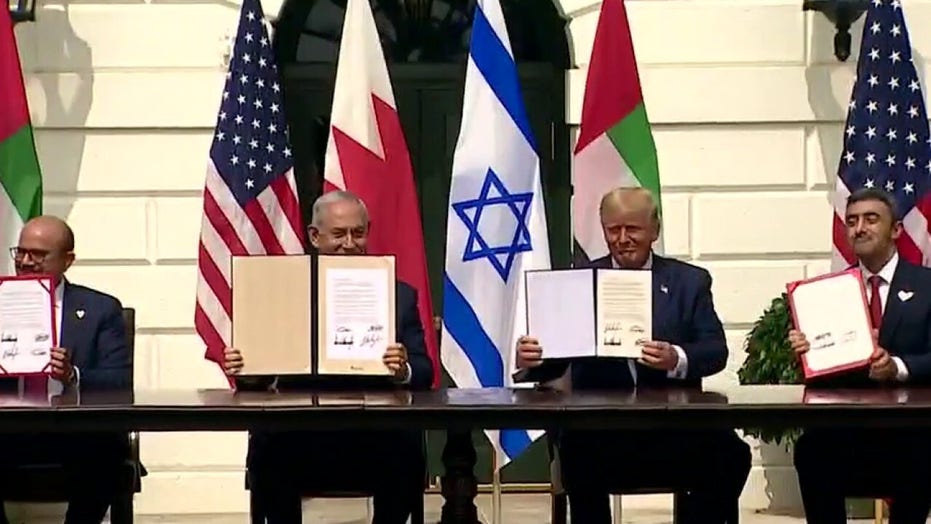Trump's Foreign Policy In The Middle East: The Role Of Personal Relationships With Arab Leaders

Table of Contents
The Importance of Personal Chemistry in Trump's Approach
Trump's emphasis on personal diplomacy, often described as "transactional relationships" or "deal-making," significantly impacted his Middle East policy. He prioritized building rapport with key figures, notably Crown Prince Mohammed bin Salman (MBS) of Saudi Arabia and Prime Minister Benjamin Netanyahu of Israel. This emphasis on personal chemistry, rather than institutional ties, became a defining feature of his foreign policy.
-
Examples of personal influence: Numerous instances show how personal meetings and phone calls directly led to policy shifts. For example, his frequent conversations with MBS heavily influenced US arms sales to Saudi Arabia and shaped the response to the Khashoggi assassination. Similarly, his close relationship with Netanyahu played a pivotal role in US decisions regarding the Israeli-Palestinian conflict.
-
Trump's communication style: Trump's direct, often blunt, communication style, while unconventional in diplomatic circles, proved surprisingly effective in building – at least initially – trust with certain Arab leaders. This contrasted sharply with more traditional diplomatic approaches that emphasized carefully crafted statements and adherence to established protocols.
-
Contrast with traditional diplomacy: Traditional diplomacy relies heavily on established institutional relationships, bureaucratic processes, and long-term strategic planning. Trump's approach often bypassed these established channels, leading to both successes and significant criticisms.
Case Study: The Abraham Accords and Personal Connections
The Abraham Accords, a series of normalization agreements between Israel and several Arab nations (UAE, Bahrain, Sudan, and Morocco), stand as a prime example of Trump's personality-driven foreign policy achieving notable success. Trump's personal engagement with key leaders was instrumental in brokering these agreements.
-
Direct engagement: Trump directly engaged with leaders like MBS, Netanyahu, and Crown Prince Mohammed bin Zayed Al Nahyan of the UAE, fostering trust and facilitating compromises. These private conversations, often shielded from public scrutiny, played a crucial role in overcoming long-standing obstacles to normalization.
-
Strategic motivations: The involved countries had various strategic motivations: The UAE and Bahrain sought closer ties with Israel to counter Iran's influence. Israel benefited from increased regional acceptance and strategic partnerships. For Trump, the Accords represented a major foreign policy achievement to bolster his image as a peacemaker.
-
Long-term impact and limitations: While hailed as a significant diplomatic achievement, the long-term impact of the Abraham Accords remains to be seen. Critics point out that the accords do not address the underlying Israeli-Palestinian conflict, a core issue driving regional instability. Furthermore, the reliance on personal relationships to sustain these agreements raises concerns about their fragility in the face of changing political dynamics.
Criticism and Challenges of a Personality-Driven Foreign Policy
Trump's reliance on personal relationships faced considerable criticism. Critics argued that this approach frequently prioritized transactional deals over broader strategic considerations, often neglecting human rights concerns and long-term regional stability.
-
Human rights concerns: Critics pointed to instances where human rights concerns were downplayed or ignored in favor of maintaining positive relationships with autocratic leaders. The Saudi Arabian human rights record, for example, came under intense scrutiny, but Trump's relationship with MBS often overshadowed these criticisms.
-
Fragile relationships: A foreign policy built primarily on personal connections is inherently fragile. Changes in leadership or shifts in political priorities within participating countries could quickly unravel agreements reached through personal rapport.
-
Lack of long-term strategy: Critics also highlighted the lack of a clear, long-term strategic vision guiding Trump's Middle East policy. The focus on short-term gains and personal relationships overshadowed the development of a comprehensive approach to address persistent challenges in the region.
Assessing the Legacy: Long-Term Impacts on US-Arab Relations
The long-term impact of Trump's personalized approach on US-Arab relations is complex and multifaceted. While the Abraham Accords represent a tangible achievement, concerns persist about the sustainability of these agreements and the overall implications for regional stability.
-
Changes in regional alliances: Trump's actions led to shifts in regional alliances, albeit with uncertain long-term consequences. The Abraham Accords, for example, reshaped dynamics between Israel and certain Arab nations but did not resolve the central Israeli-Palestinian conflict.
-
Shifting the landscape: Trump's policies undeniably shifted the landscape of US-Arab relations, creating new partnerships and opportunities while potentially destabilizing others. The extent to which these changes will endure remains an open question.
-
Predictions for future interactions: Future interactions will likely be influenced by Trump's legacy, with subsequent administrations needing to navigate the complexities of the relationships he forged and the agreements he brokered. The reliance on personal connections versus institutional frameworks will continue to shape US foreign policy discussions in the region.
Conclusion:
Trump's Middle East foreign policy was notably characterized by its emphasis on personal relationships with Arab leaders. While this approach yielded some successes, such as the Abraham Accords, it also faced significant criticisms regarding human rights, regional stability, and the lack of a comprehensive long-term strategy. Further research and analysis are crucial to fully understand the lasting consequences of this personalized approach. The effectiveness and ethical considerations of prioritizing personal relationships in diplomatic efforts remain a critical topic for future discussions on US foreign policy in the Middle East. The debate over the best approach – personal relationships versus institutional diplomacy – will continue to shape US foreign policy in the region for years to come.

Featured Posts
-
 Shifting Gears How Us Tariffs Impact Hondas Production And Canadian Exports
May 17, 2025
Shifting Gears How Us Tariffs Impact Hondas Production And Canadian Exports
May 17, 2025 -
 Justes Jocytes Karjeros Etapas Vilerbane Oficialus Pabaigos Patvirtinimas
May 17, 2025
Justes Jocytes Karjeros Etapas Vilerbane Oficialus Pabaigos Patvirtinimas
May 17, 2025 -
 Josh Harts Impact On The Knicks A Draymond Green Comparison
May 17, 2025
Josh Harts Impact On The Knicks A Draymond Green Comparison
May 17, 2025 -
 Raketniy Udar Po Ukraine Rf Vypustila Bolee 200 Raket I Bespilotnikov
May 17, 2025
Raketniy Udar Po Ukraine Rf Vypustila Bolee 200 Raket I Bespilotnikov
May 17, 2025 -
 Wnba Players Demands Angel Reese Supports Potential Lockout
May 17, 2025
Wnba Players Demands Angel Reese Supports Potential Lockout
May 17, 2025
